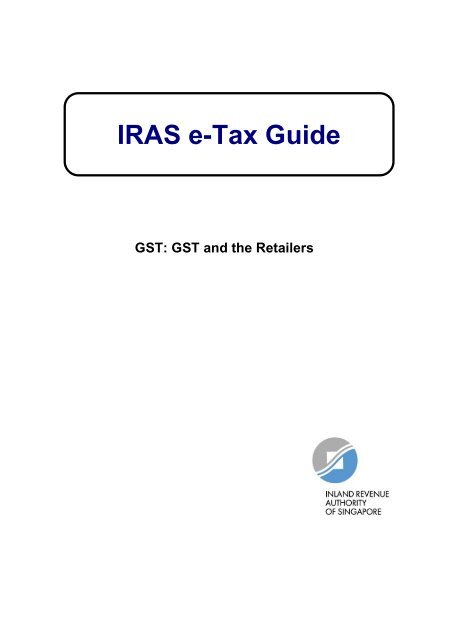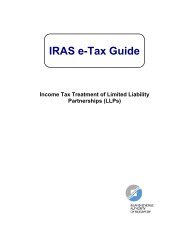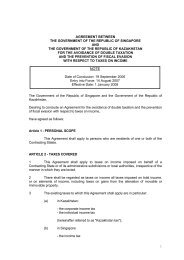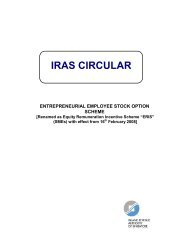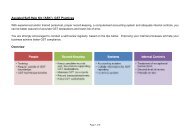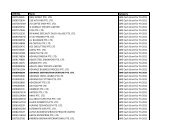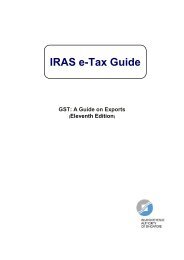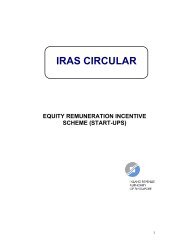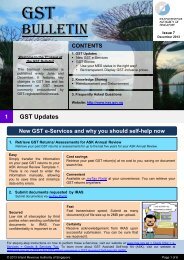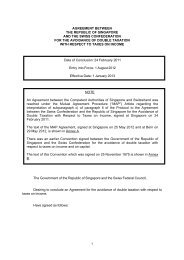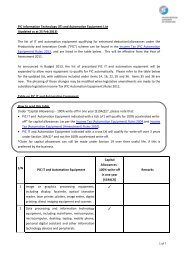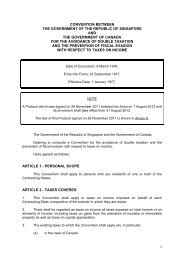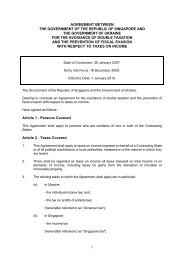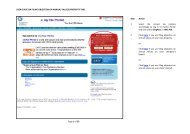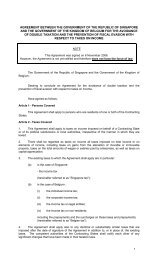GST and the Retailers - IRAS
GST and the Retailers - IRAS
GST and the Retailers - IRAS
Create successful ePaper yourself
Turn your PDF publications into a flip-book with our unique Google optimized e-Paper software.
<strong>IRAS</strong> e-Tax Guide<br />
<strong>GST</strong>: <strong>GST</strong> <strong>and</strong> <strong>the</strong> <strong>Retailers</strong>
Published by<br />
Inl<strong>and</strong> Revenue Authority of Singapore<br />
Revised Edition November 2004<br />
Revised Edition 1 July 2007<br />
Revised Edition 1 May 2008 (Revised paragraphs 2.1 <strong>and</strong> Appendix B)<br />
Revised Edition 11 January 2011 (Revisions made to paragraphs 2.9, 3.2.1 <strong>and</strong> 3.4.1 to<br />
reflect <strong>the</strong> changes made to <strong>the</strong> time of supply rules)<br />
© Inl<strong>and</strong> Revenue Authority of Singapore<br />
All rights reserved. No part of this publication<br />
may be reproduced or transmitted in any form<br />
or by any means, including photocopying<br />
<strong>and</strong> recording without <strong>the</strong> written<br />
permission of <strong>the</strong> copyright holder,<br />
application for which should be addressed to<br />
<strong>the</strong> publisher. Such written permission must<br />
also be obtained before any part of this<br />
publication is stored in a retrieval system of any<br />
nature.
Contents<br />
1. Purchases & Imports<br />
PAGE<br />
1.1 If I purchase goods on terms allowing a discount for prompt 1<br />
payment from my supplier, should <strong>GST</strong> be computed on <strong>the</strong><br />
original price or discounted price?<br />
1.2 I am entitled to a volume-related discount offered by my 1<br />
supplier when I reach a minimum purchase amount within a<br />
specified period. On what basis is <strong>GST</strong> charged on?<br />
1.3 Are we entitled to refuse payment of <strong>GST</strong> to suppliers who 1<br />
do not indicate <strong>GST</strong> registration numbers on <strong>the</strong>ir tax invoices?<br />
1.4 Is <strong>the</strong> commission paid to a credit card company subject to <strong>GST</strong>? 1<br />
1.5 Many perishable products have an expiry date. Can we claim 2<br />
<strong>GST</strong> paid if <strong>the</strong>se products are unsold after <strong>the</strong> expiry date?<br />
1.6 I purchase goods from overseas suppliers. Do I have to pay <strong>GST</strong>? 2<br />
1.7 How is <strong>GST</strong> charged on imports? 2<br />
2. Sales<br />
2.1 Do I need to issue tax invoices for sales to customers? 3<br />
2.2 Is <strong>the</strong> <strong>GST</strong> computation required only for <strong>the</strong> total value 3<br />
of <strong>the</strong> receipt or for <strong>the</strong> individual items?<br />
2.3 Customers who make purchases with a VIP card are entitled 3<br />
to a 10% discount. Do I give discount based on <strong>the</strong> <strong>GST</strong>inclusive<br />
price or <strong>GST</strong>-exclusive price?<br />
2.4 Is <strong>GST</strong> to be rounded up, down or off? 4<br />
2.5 When a sale is made <strong>and</strong> a deposit is collected, do I account 4<br />
for <strong>GST</strong> on <strong>the</strong> deposit?
PAGE<br />
2.6 A customer wants to buy product A which is valued at $ 1,500. 4<br />
He trades-in Product B <strong>and</strong> thus pays a price of $ 1,200 for<br />
product A. Should I charge <strong>GST</strong> on <strong>the</strong> original price of A or <strong>the</strong><br />
discounted price?<br />
2.7 When a customer returns some goods which he finds unsatisfactory, 4<br />
should I refund him <strong>the</strong> <strong>GST</strong> paid?<br />
2.8 If I sell <strong>the</strong> returned goods subsequently, do I charge <strong>GST</strong> on <strong>the</strong> sale? 5<br />
2.9 I sell my goods on a sale or return terms. When do I account for 5<br />
<strong>the</strong> <strong>GST</strong>?<br />
2.10 The majority of my customers are tourists <strong>and</strong> sometimes upon 6<br />
<strong>the</strong>ir request, I will export <strong>the</strong> goods to <strong>the</strong>ir overseas addresses.<br />
Should I charge <strong>the</strong>m <strong>GST</strong>?<br />
2.11 Can I absorb <strong>GST</strong> on behalf of my customers? 6<br />
3. <strong>Retailers</strong>’ Special Interest Areas<br />
3.1 Gifts<br />
3.1.1 Are business gifts subject to <strong>GST</strong>? 7<br />
3.1.2 If I purchase items to give as free gifts to customers 7<br />
e.g. hampers to be given away during festive seasons,<br />
can I claim input tax?<br />
3.1.3 For every 10 items purchased by my customer at <strong>the</strong> price 8<br />
of $20, I offer one as a free gift. Do I charge <strong>GST</strong> on<br />
<strong>the</strong> sale of 10 or 11 items?
PAGE<br />
3.1.4 What is <strong>the</strong> <strong>GST</strong> treatment in a "Gift with Purchase" promotion 8<br />
whereby an item is given away free of charge with <strong>the</strong> purchase<br />
of a specific item or attached within a package to consumers?<br />
3.1.5 What is <strong>the</strong> <strong>GST</strong> treatment in a "Purchase with Purchase" 8<br />
promotion where consumers are entitled to purchase ano<strong>the</strong>r<br />
item at a reduced price upon a purchase of a specific item<br />
or a purchase with a certain amount?<br />
3.2 Hire-purchase<br />
3.2.1 Does <strong>GST</strong> apply to <strong>the</strong> goods bought under a hire-purchase 8<br />
agreement? If so, when should I account for <strong>GST</strong>?<br />
3.2.2 What if I repossess <strong>the</strong> goods which were previously sold 9<br />
under a hire-purchase agreement?<br />
3.3 Price Display<br />
3.3.1 Is it m<strong>and</strong>atory to display price tags which are inclusive of <strong>GST</strong> 10<br />
3.3.2 Retail prices are subject to bargaining. How should goods 10<br />
be priced <strong>and</strong> <strong>GST</strong> charged?<br />
3.4 Goods on Consignment<br />
3.4.1 What is <strong>the</strong> <strong>GST</strong> treatment for consignment goods (for consignee)? 10<br />
3.4.2 What is <strong>the</strong> <strong>GST</strong> treatment for consignment goods (for consignor)? 11<br />
3.4.3 Is <strong>GST</strong> chargeable if I receive a separate commission when <strong>the</strong> 12<br />
3.5 Concessionaires<br />
merch<strong>and</strong>ise (under consignment) is sold?<br />
3.5.1 How do I account for <strong>GST</strong> on my concessionaire sales? 13<br />
3.5.2 Is <strong>GST</strong> chargeable on rental/commission collected from 13<br />
concessionaires?<br />
3.6 O<strong>the</strong>rs<br />
3.6.1 If I receive free samples from my supplier, do I need to 13<br />
pay <strong>GST</strong>?
PAGE<br />
3.6.2 During a clearance sale, we sell our goods at a discounted price 13<br />
(which can be below <strong>the</strong> cost price). How do we account for <strong>GST</strong>?<br />
3.6.3 Do I need to account output tax on stolen goods? 13<br />
3.6.4 How do I account for <strong>GST</strong> on <strong>the</strong> sale of gift vouchers to 13<br />
customers?<br />
3.6.5 How would I charge <strong>GST</strong> on <strong>the</strong> lease of goods to my customer? 13<br />
3.6.6 Must I levy <strong>GST</strong> if I sell goods to tourists? 14<br />
4. Contact information 14<br />
Appendix A 15<br />
Appendix B 16
<strong>GST</strong> <strong>and</strong> <strong>the</strong> <strong>Retailers</strong><br />
This guide is designed to give <strong>GST</strong>-registered retailers a better underst<strong>and</strong>ing of<br />
<strong>the</strong> Goods & Services Tax <strong>and</strong> its impact on <strong>the</strong>ir retail trade.<br />
1. PURCHASES & IMPORTS<br />
1.1 If I purchase goods on terms allowing a discount for prompt<br />
payment from my supplier, should <strong>GST</strong> be computed on <strong>the</strong><br />
original price or discounted price?<br />
<strong>GST</strong> should be computed on <strong>the</strong> discounted price, regardless of<br />
whe<strong>the</strong>r a discount is subsequently given.<br />
In <strong>the</strong> case where <strong>the</strong> discount given varies with <strong>the</strong> time of repayment,<br />
<strong>the</strong> discounted price will be <strong>the</strong> price net of <strong>the</strong> best discount offered.<br />
For example:<br />
Prompt payment discount 5% within 30<br />
days 2% within<br />
60 days<br />
Price before discount (excl. <strong>GST</strong>) S$100<br />
<strong>GST</strong> S$(100 x 95% x 7%)<br />
S$6.65<br />
1.2 I am entitled to a volume-related discount offered by my<br />
supplier when I reach a minimum purchase amount within a<br />
specified period. On what basis is <strong>GST</strong> charged on?<br />
<strong>GST</strong> is chargeable based on <strong>the</strong> full amount paid each time you made a<br />
purchase. If you later earn a discount, <strong>the</strong> tax is <strong>the</strong>n reduced <strong>and</strong> a<br />
credit note will be issued by <strong>the</strong> supplier to adjust <strong>the</strong> amount of tax<br />
previously charged. You may <strong>the</strong>n do <strong>the</strong> necessary adjustments in your<br />
input tax claim.<br />
1.3 Are we entitled to refuse payment of <strong>GST</strong> to suppliers who do not<br />
indicate <strong>GST</strong> registration numbers on <strong>the</strong>ir tax invoices?<br />
You can ask <strong>the</strong> suppliers to indicate <strong>the</strong>ir <strong>GST</strong> registration numbers. If<br />
you have your suppliers' company registration number, you may also<br />
call <strong>GST</strong> helpline on 1800 356 8633 to check whe<strong>the</strong>r <strong>the</strong> suppliers are<br />
<strong>GST</strong> registered.<br />
1.4 Is <strong>the</strong> commission paid to a credit card company subject to <strong>GST</strong>?<br />
No, <strong>the</strong> provision of credit card service to you as a retailer is an exempt<br />
1
<strong>GST</strong> <strong>and</strong> <strong>the</strong> <strong>Retailers</strong><br />
supply.<br />
1.5 Many perishable products have an expiry date. Can we claim <strong>GST</strong><br />
paid if <strong>the</strong>se products are unsold after <strong>the</strong> expiry date?<br />
A claim for input tax paid can be made in <strong>the</strong> same accounting period<br />
when <strong>the</strong>y are purchased. You do not have to wait for <strong>the</strong>m to be sold<br />
before making a claim.<br />
1.6 I purchase goods from overseas suppliers. Do I have to pay <strong>GST</strong>?<br />
You are not required to pay <strong>GST</strong> to your overseas suppliers since <strong>the</strong>y<br />
are not <strong>GST</strong>-registered persons. However, <strong>GST</strong> will be levied on all<br />
imports regardless of whe<strong>the</strong>r <strong>the</strong> importers are <strong>GST</strong>-registered or not.<br />
Hence, you will have to make <strong>GST</strong> payment to Customs when you import<br />
<strong>the</strong> goods into Singapore.<br />
1.7 How is <strong>GST</strong> charged on imports?<br />
Generally, <strong>GST</strong> is charged on <strong>the</strong> CIF value (cost, insurance <strong>and</strong><br />
freight) plus all customs duties payable.<br />
Note that if your imports are invoiced in a foreign currency, it should be<br />
converted into Singapore dollars using <strong>the</strong> exchange rate published by<br />
<strong>the</strong> Singapore Customs at <strong>the</strong> time of submission of payment<br />
declaration. These exchange rates can be obtained by calling <strong>the</strong><br />
Singapore Customs at 6355-2000.<br />
2
<strong>GST</strong> <strong>and</strong> <strong>the</strong> <strong>Retailers</strong><br />
2 . S A L E S<br />
2.1 Do I need to issue tax invoices for sales to customers?<br />
You are required to issue a tax invoice for your goods sold or services<br />
rendered. Details to be shown on <strong>the</strong> tax invoice can be found in<br />
Appendix A. If <strong>the</strong> value of <strong>the</strong> goods or services supplied including <strong>GST</strong><br />
does not exceed $1000, a simplified tax invoice may be issued (see<br />
Appendix B).<br />
If your customer is not <strong>GST</strong>-registered, you may issue a serially printed<br />
receipt instead. The receipt should show your name <strong>and</strong> <strong>GST</strong> registration<br />
number, date of issue, <strong>the</strong> total amount payable including <strong>the</strong> total <strong>GST</strong><br />
chargeable on <strong>the</strong> supply <strong>and</strong> <strong>the</strong> words "Amount payable includes<br />
<strong>GST</strong>".<br />
2.2 Is <strong>the</strong> <strong>GST</strong> computation required only for <strong>the</strong> total value of <strong>the</strong> receipt<br />
or for <strong>the</strong> individual items?<br />
A <strong>GST</strong> computation is required only for <strong>the</strong> total value of goods or<br />
services on <strong>the</strong> receipt.<br />
2.3 Customers who make purchases with a VIP card are entitled to a<br />
10% discount. Do I give discount based on <strong>the</strong> <strong>GST</strong>-inclusive price<br />
or <strong>GST</strong>-exclusive price?<br />
Both are acceptable as <strong>the</strong> <strong>GST</strong> computed will be <strong>the</strong> same. Please refer<br />
to <strong>the</strong> following examples:<br />
Example 1<br />
S$<br />
Price of <strong>the</strong> item<br />
100,00 (<strong>GST</strong>-exclusive)<br />
Less discount (10%x $100) (10.00)<br />
Sub-total 90.00<br />
<strong>GST</strong> @7% 6.30<br />
Total price payable 96.30<br />
Example 2<br />
S$<br />
Price of <strong>the</strong> item<br />
107.00 (<strong>GST</strong>-inclusive)<br />
Less discount (10%x $107) (10.70)<br />
Total price payable 96.30<br />
<strong>GST</strong> @ 7% (7/107x $96.30) 6.30<br />
3
<strong>GST</strong> <strong>and</strong> <strong>the</strong> <strong>Retailers</strong><br />
2.4 Is <strong>GST</strong> to be rounded up, down or off?<br />
If <strong>the</strong> <strong>GST</strong> payable amounts to a fraction of a cent, <strong>the</strong> following treatment<br />
will apply:<br />
For fraction of a cent that is 4 or below, it will be rounded down. For<br />
example, S$1.144 will be rounded down to S$1.14.<br />
For fraction of a cent that is 5 or above, it will be rounded up. For<br />
example, S$1.145 will be rounded up to S$1.15.<br />
2.5 When a sale is made <strong>and</strong> a deposit is collected, do I account for <strong>GST</strong><br />
on <strong>the</strong> deposit?<br />
If <strong>the</strong> deposit forms part payment for <strong>the</strong> goods supplied. <strong>GST</strong> has to be<br />
accounted for on <strong>the</strong> amount of deposit. Sometimes, a deposit is made<br />
<strong>and</strong> <strong>the</strong> goods are removed or made available or services performed. In<br />
such cases, <strong>GST</strong> will be due on <strong>the</strong> full price.<br />
If <strong>the</strong> deposit is refundable <strong>and</strong> used as a security, <strong>GST</strong> is not chargeable.<br />
An example is a deposit for <strong>the</strong> safe return of goods.<br />
2.6 A customer wants to buy product A which is valued at<br />
S$1,500. He trades-in Product B <strong>and</strong> thus pays a price of S$1,200<br />
for product A. Should I charge <strong>GST</strong> on <strong>the</strong> original price of A or <strong>the</strong><br />
discounted price?<br />
You will have to charge <strong>GST</strong> on <strong>the</strong> value of S$1,500. This is because<br />
when <strong>the</strong> consideration for a supply is not in money or not wholly in money,<br />
<strong>GST</strong> is chargeable on <strong>the</strong> open market value of <strong>the</strong> goods. Since <strong>the</strong><br />
consideration received is <strong>the</strong> cash payment plus Product B, <strong>GST</strong> will be<br />
charged on <strong>the</strong> open market value of Product A which is S$1,500.<br />
2.7 When a customer returns some goods which he finds unsatisfactory,<br />
should I refund him <strong>the</strong> <strong>GST</strong> paid?<br />
This is considered an abortive sale. If you had issued a tax invoice earlier,<br />
you can issue a credit note <strong>and</strong> make a refund to <strong>the</strong> customer. If a sale<br />
was made to a non <strong>GST</strong>-registered customer <strong>and</strong> a receipt was issued,<br />
you should cancel <strong>the</strong> original receipt <strong>and</strong> make a refund to him.<br />
For easy reference, you should make a cross reference on <strong>the</strong> credit<br />
note to <strong>the</strong> tax invoice issued earlier or keep a record of cancelled<br />
receipts. You can <strong>the</strong>n claim <strong>the</strong> <strong>GST</strong> you refunded which you have<br />
accounted for earlier.<br />
4
<strong>GST</strong> <strong>and</strong> <strong>the</strong> <strong>Retailers</strong><br />
2.8 If I sell <strong>the</strong> returned goods subsequently, do I charge <strong>GST</strong> on <strong>the</strong> sale?<br />
When <strong>the</strong> returned goods are sold subsequently, it is a separate supply.<br />
You are required to charge <strong>GST</strong> on <strong>the</strong> sale of <strong>the</strong> returned goods.<br />
2.9 I sell my goods on a sale or return terms, when do I account for <strong>GST</strong>?<br />
Prior to 1 Jan 2011<br />
For goods sold on a sale or return terms, <strong>the</strong> supply of goods is treated as<br />
taking place at <strong>the</strong> time when it becomes certain that a supply has taken<br />
place (e.g. upon receipt of a letter of acceptance) or 12 months after <strong>the</strong><br />
removal of <strong>the</strong> goods, whichever is <strong>the</strong> earlier.<br />
With effect from 1 Jan 2011<br />
With effect from 1 Jan 2011, <strong>the</strong> <strong>GST</strong> rule for time of supply will be<br />
changed to be in line with commercial practices. This is to help<br />
businesses comply with <strong>the</strong> rules easily. If <strong>the</strong> supply is on sale or<br />
return terms, <strong>the</strong> time of supply will be treated as taking place at <strong>the</strong><br />
earliest of:<br />
a) When any payment in respect of <strong>the</strong> supply is received;<br />
b) When invoice in respect of <strong>the</strong> supply is issued; or<br />
c) 12 months after <strong>the</strong> removal of <strong>the</strong> goods.<br />
The payment received must be to discharge an obligation to pay for <strong>the</strong><br />
supply arising from <strong>the</strong> adoption of <strong>the</strong> sale. The mere receipt of<br />
payment will not be regarded as consideration received if it is held as<br />
security pending <strong>the</strong> adoption of <strong>the</strong> sale. If such security deposit is<br />
collected upfront, payment is received only when <strong>the</strong> deposit is applied<br />
as all or part of <strong>the</strong> consideration for <strong>the</strong> supply, following <strong>the</strong> adoption of<br />
<strong>the</strong> sale.<br />
Once <strong>the</strong>re is a payment received or an invoice issued, <strong>GST</strong> has to be<br />
accounted for based on <strong>the</strong> full selling price of <strong>the</strong> goods.<br />
Prior to 1 January 2011, <strong>the</strong> issuance of a tax invoice – <strong>and</strong> not any o<strong>the</strong>r<br />
type of invoice – is an event that will trigger <strong>the</strong> time of supply. With<br />
effect from 1 January 2011, <strong>the</strong> issuance of any type of invoice will be an<br />
event that triggers <strong>the</strong> time of supply. This includes a tax invoice as well<br />
as any document that serves as a bill for payment for supplies made by a<br />
<strong>GST</strong>-registered supplier. An example of such document would be a debit<br />
note.<br />
In general, documents such as sales order, pro-forma invoice, statement<br />
of accounts <strong>and</strong> letter/statement of claims are not considered as invoices<br />
for <strong>GST</strong> time of supply purposes. This is because <strong>the</strong>se documents are<br />
5
<strong>GST</strong> <strong>and</strong> <strong>the</strong> <strong>Retailers</strong><br />
often not billing for payments <strong>and</strong> would <strong>the</strong>refore not be treated as<br />
invoices based on normal commercial practices.<br />
For more details, please refer to <strong>the</strong> e-Tax Guide on <strong>GST</strong>: Time of<br />
Supply Rules<br />
2.10 The majority of my customers are tourists <strong>and</strong> sometimes upon<br />
<strong>the</strong>ir request, I will export <strong>the</strong> goods to <strong>the</strong>ir overseas addresses.<br />
Should I charge <strong>the</strong>m <strong>GST</strong>?<br />
In such cases, you are exporting <strong>the</strong> goods which you have sold. As long<br />
as you hold sufficient export documents to prove that <strong>the</strong> goods are<br />
exported, you can zero-rate (i.e. charge 0% <strong>GST</strong>) <strong>the</strong> sale.<br />
2.11 Can I absorb <strong>GST</strong> on behalf of my customers?<br />
The total amount paid by <strong>the</strong> customer is <strong>the</strong> consideration received from<br />
him. The amount of <strong>GST</strong> which you should account for is <strong>the</strong> prevailing<br />
tax fraction of <strong>the</strong> consideration. For instance, if your customer paid $100,<br />
<strong>the</strong> <strong>GST</strong> to be accounted for is S$6.54 (7/107 x S$100).<br />
6
<strong>GST</strong> <strong>and</strong> <strong>the</strong> <strong>Retailers</strong><br />
3. RETAILERS' SPECIAL INTEREST AREAS<br />
3.1 Gifts<br />
3.1.1 Are business gifts subject to <strong>GST</strong>?<br />
A <strong>GST</strong>-registered trader is not obliged to account for deemed output<br />
tax on a gift of goods made in <strong>the</strong> course or fur<strong>the</strong>rance of business only<br />
if:<br />
(i)<br />
(ii)<br />
(iii)<br />
<strong>the</strong> cost of <strong>the</strong> gift does not exceed $200 <strong>and</strong> it does not form part<br />
of a series of gifts; or<br />
<strong>the</strong> gifts were purchased from a non-<strong>GST</strong> registered supplier ie.<br />
no input tax is claimable; or<br />
<strong>the</strong> <strong>GST</strong>-registered trader is not entitled to claim <strong>GST</strong> on <strong>the</strong><br />
purchase of gift.<br />
Where 3 or more gifts are given to <strong>the</strong> same person within a period of 3<br />
months, it is considered a series or succession of gifts. For <strong>the</strong> purposes<br />
of determining whe<strong>the</strong>r a gift constitutes a series of gifts, gifts purchased<br />
from non <strong>GST</strong>-registered persons must be taken into account.<br />
The time frame of 3 months for determining whe<strong>the</strong>r <strong>the</strong>re is a<br />
series of gifts will generally be <strong>the</strong> trader's prescribed accounting<br />
period. However, traders whose prescribed accounting period is not 3<br />
months, <strong>the</strong> time frame is as follows:<br />
Prescribed Accounting Period<br />
St<strong>and</strong>ard accounting period<br />
(3months)<br />
One month accounting<br />
period<br />
Six month accounting period<br />
Time Frame<br />
- Prescribed accounting period<br />
- Calendar quarter<br />
- Half <strong>the</strong> prescribed<br />
accounting<br />
period<br />
Once it has been established that <strong>the</strong>re is a series of gifts, output tax<br />
must be accounted for on all gifts purchased from <strong>GST</strong>-registered<br />
persons even if <strong>the</strong> cost of each gift does not exceed $200.<br />
3.1.2 If I purchase items to give as free gifts to customers e.g.<br />
hampers to be given away during festive seasons, can I claim<br />
input tax?<br />
Yes, any <strong>GST</strong> incurred for business purposes can be claimed as input<br />
tax. However, if <strong>the</strong> cost of <strong>the</strong> gift exceeds S$200, you are liable to<br />
account for output tax based on <strong>the</strong> open market value of <strong>the</strong> goods.<br />
7
<strong>GST</strong> <strong>and</strong> <strong>the</strong> <strong>Retailers</strong><br />
3.1.3 For every 10 items purchased by my customer at <strong>the</strong> price of<br />
S$20, I offer one as a free gift. Do I charge <strong>GST</strong> on <strong>the</strong> sale of 10 or<br />
11 items?<br />
<strong>GST</strong> should be charged as if 11 items are sold at <strong>the</strong> price of 10 items<br />
i.e. S$20.00.<br />
3.1.4 What is <strong>the</strong> <strong>GST</strong> treatment in a "Gift with Purchase" promotion<br />
whereby an item is given away free of charge with <strong>the</strong> purchase of<br />
a specific item or attached within a package to consumers?<br />
We will treat <strong>the</strong> whole package as being sold at a price of <strong>the</strong> main item.<br />
<strong>GST</strong> will be charged on <strong>the</strong> price paid by <strong>the</strong> consumers.<br />
3.1.5 What is <strong>the</strong> <strong>GST</strong> treatment in a "Purchase with Purchase"<br />
promotion where consumers are entitled to purchase<br />
ano<strong>the</strong>r item at a reduced price upon a purchase of a specific<br />
item or a purchase with a certain amount?<br />
<strong>GST</strong> will be charged on <strong>the</strong> full price of <strong>the</strong> first item <strong>and</strong> on <strong>the</strong> reduced<br />
price of <strong>the</strong> second item.<br />
3.2 Hire-purchase<br />
3.2.1 Does <strong>GST</strong> apply to <strong>the</strong> goods bought under a hire-purchase<br />
agreement? If so, when should I account for <strong>GST</strong>?<br />
Under a hire purchase agreement, <strong>the</strong>re are 2 supplies involved: a supply<br />
of goods <strong>and</strong> a supply of credit.<br />
<strong>GST</strong> is payable on <strong>the</strong> cash price of <strong>the</strong> goods only. Credit charges (i.e.<br />
hire purchase interest) incurred is exempt from <strong>GST</strong> provided that a<br />
separate charge is made <strong>and</strong> disclosed to <strong>the</strong> recipient of <strong>the</strong> supply of<br />
goods. O<strong>the</strong>rwise, <strong>the</strong> total amount payable is subject to <strong>GST</strong>.<br />
Prior to 1 Jan 2011<br />
For goods sold under hire purchase. <strong>GST</strong> will be charged at <strong>the</strong> earliest of<br />
<strong>the</strong> following 3 events:<br />
a) when goods are removed or made available to <strong>the</strong> hirer;<br />
b) when payment is received;<br />
c) when tax invoice is issued.<br />
Thus, if <strong>the</strong> goods are removed or made available to <strong>the</strong> customers before<br />
8
<strong>GST</strong> <strong>and</strong> <strong>the</strong> <strong>Retailers</strong><br />
<strong>the</strong> issue of tax invoice or payment of <strong>the</strong> instalments, <strong>GST</strong> will be<br />
imposed upfront.<br />
With effect from 1 Jan 2011<br />
With effect from 1 Jan 2011, <strong>the</strong> <strong>GST</strong> rule for time of supply will be<br />
changed to be in line with commercial practices. This is to help<br />
businesses comply with <strong>the</strong> rules easily. For goods sold under hirepurchase,<br />
full output tax will be accounted for based on <strong>the</strong> earlier of <strong>the</strong><br />
following:<br />
a) when an invoice is issued<br />
b) when payment is received<br />
Based on <strong>the</strong> rules above, <strong>the</strong> supplier cum financier has to account for<br />
output tax on <strong>the</strong> full value of supply when he first issues an invoice to or<br />
receives <strong>the</strong> first payment from <strong>the</strong> customer.<br />
Prior to 1 January 2011, <strong>the</strong> issuance of a tax invoice – <strong>and</strong> not any o<strong>the</strong>r<br />
type of invoice – is an event that will trigger <strong>the</strong> time of supply. With<br />
effect from 1 January 2011, <strong>the</strong> issuance of any type of invoice will be an<br />
event that triggers <strong>the</strong> time of supply. This includes a tax invoice as well<br />
as any document that serves as a bill for payment for supplies made by a<br />
<strong>GST</strong>-registered supplier. An example of such document would be a debit<br />
note.<br />
In general, documents such as sales order, pro-forma invoice, statement<br />
of accounts <strong>and</strong> letter/statement of claims are not considered as invoices<br />
for <strong>GST</strong> time of supply purposes. This is because <strong>the</strong>se documents are<br />
often not billing for payments <strong>and</strong> would <strong>the</strong>refore not be treated as<br />
invoices based on normal commercial practices.<br />
For more details, please refer to <strong>the</strong> e-Tax Guide on <strong>GST</strong>: Time of<br />
Supply Rules<br />
3.2.2 What if I repossess <strong>the</strong> goods which were previously sold under a<br />
hire-purchase agreement?<br />
Repossession of <strong>the</strong> goods does not constitute a supply <strong>and</strong> no <strong>GST</strong> is<br />
chargeable.<br />
If you subsequently dispose of <strong>the</strong>se goods, <strong>the</strong> supply will be treated as<br />
being made by <strong>the</strong> hirer. Therefore, whe<strong>the</strong>r <strong>the</strong> supply is subject to<br />
<strong>GST</strong> depends on <strong>the</strong> status of <strong>the</strong> hirer i.e. whe<strong>the</strong>r <strong>the</strong> hirer is a <strong>GST</strong>registered<br />
person or not. This means that you would have to account for<br />
<strong>GST</strong> if <strong>the</strong> hirer is a <strong>GST</strong>-registered person. However, if <strong>the</strong> hirer is not a<br />
<strong>GST</strong>-registered person, no <strong>GST</strong> needs to be charged on <strong>the</strong> supply.<br />
9
<strong>GST</strong> <strong>and</strong> <strong>the</strong> <strong>Retailers</strong><br />
3.3 Price Display<br />
3.3.1 Is it m<strong>and</strong>atory to display price tags which are inclusive of <strong>GST</strong>?<br />
Yes, all prices displayed, advertised, published or quoted by a <strong>GST</strong>registered<br />
person for any supply of goods or services should be<br />
inclusive of <strong>GST</strong>, unless prior approval has been sought from <strong>the</strong><br />
Comptroller of <strong>GST</strong> to do o<strong>the</strong>rwise.<br />
3.3.2 Retail prices are subject to bargaining. How should goods be<br />
priced <strong>and</strong> <strong>GST</strong> charged?<br />
The price on display should be <strong>the</strong> usual sales price inclusive of <strong>GST</strong>.<br />
The amount of <strong>GST</strong> charged to <strong>the</strong> customer will be <strong>the</strong> prevailing tax<br />
fraction of <strong>the</strong> final price paid by <strong>the</strong> customer.<br />
3.4 Goods on Consignment<br />
3.4.1 What is <strong>the</strong> <strong>GST</strong> treatment for consignment goods (for consignee)?<br />
Whenever you (consignee) sell goods which are on consignment, you will<br />
have to account for output tax on your selling price based on <strong>the</strong> time of<br />
supply rules.<br />
Prior to 1 Jan 2011<br />
Prior to 1 Jan 2011, you will have to account for output tax at <strong>the</strong> earliest of<br />
<strong>the</strong> followings events:<br />
<strong>the</strong> goods are removed or are made available;<br />
you issue a tax invoice for that supply;<br />
you receive payment for that supply.<br />
However, if you issue <strong>the</strong> tax invoice within 14 days from <strong>the</strong> date <strong>the</strong><br />
goods are removed or made available, <strong>the</strong> time of supply will be <strong>the</strong> date<br />
of <strong>the</strong> tax invoice.<br />
With effect from 1 Jan 2011<br />
With effect from 1 Jan 2011, <strong>the</strong> <strong>GST</strong> rule for time of supply will be<br />
changed to be in line with commercial practices. This is to help<br />
businesses comply with <strong>the</strong> rules easily. For most transactions, output<br />
tax will be accounted for based on <strong>the</strong> earlier of <strong>the</strong> following:<br />
when an invoice is issued<br />
10
<strong>GST</strong> <strong>and</strong> <strong>the</strong> <strong>Retailers</strong><br />
when payment is received<br />
Prior to 1 January 2011, <strong>the</strong> issuance of a tax invoice – <strong>and</strong> not any o<strong>the</strong>r<br />
type of invoice – is an event that will trigger <strong>the</strong> time of supply. With<br />
effect from 1 January 2011, <strong>the</strong> issuance of any type of invoice will be an<br />
event that triggers <strong>the</strong> time of supply. This includes a tax invoice as well<br />
as any document that serves as a bill for payment for supplies made by a<br />
<strong>GST</strong>-registered supplier. An example of such document would be a debit<br />
note.<br />
In general, documents such as sales order, pro-forma invoice, statement<br />
of accounts <strong>and</strong> letter/statement of claims are not considered as invoices<br />
for <strong>GST</strong> time of supply purposes. This is because <strong>the</strong>se documents are<br />
often not billing for payments <strong>and</strong> would <strong>the</strong>refore not be treated as<br />
invoices based on normal commercial practices.<br />
For more details, please refer to <strong>the</strong> e-Tax Guide on <strong>GST</strong>: Time of<br />
Supply Rules<br />
3.4.2 What is <strong>the</strong> <strong>GST</strong> treatment for consignment goods (for consignor)?<br />
Whenever you (consignor) sell goods which are on consignment o<strong>the</strong>r<br />
than on sale or return terms (see paragraph 2.9 above), you will have to<br />
account for output tax on your selling price based on <strong>the</strong> time of supply<br />
rules as explained below.<br />
Prior to 1 Jan 2011<br />
Prior to 1 Jan 2011, <strong>the</strong> suppliers (consignor) will have to account output<br />
tax at <strong>the</strong> earlier of <strong>the</strong> following events:<br />
a) <strong>the</strong> date when tax invoice is issued ; or<br />
b) <strong>the</strong> date when a payment is received<br />
With effect from 1 Jan 2011<br />
With effect from 1 Jan 2011, changes are made to <strong>the</strong> tax point based on<br />
invoice. Prior to 1 January 2011, <strong>the</strong> issuance of a tax invoice – <strong>and</strong> not<br />
any o<strong>the</strong>r type of invoice – is an event that will trigger <strong>the</strong> time of supply.<br />
With effect from 1 January 2011, <strong>the</strong> issuance of any type of invoice will<br />
be an event that triggers <strong>the</strong> time of supply. This includes a tax invoice<br />
as well as any document that serves as a bill for payment for supplies<br />
made by a <strong>GST</strong>-registered supplier. An example of such document would<br />
be a debit note.<br />
In general, documents such as sales order, pro-forma invoice, statement<br />
of accounts <strong>and</strong> letter/statement of claims are not considered as invoices<br />
11
<strong>GST</strong> <strong>and</strong> <strong>the</strong> <strong>Retailers</strong><br />
for <strong>GST</strong> time of supply purposes. This is because <strong>the</strong>se documents are<br />
often not billing for payments <strong>and</strong> would <strong>the</strong>refore not be treated as<br />
invoices based on normal commercial practices.<br />
O<strong>the</strong>r than <strong>the</strong> changes to <strong>the</strong> tax point based on tax invoice, <strong>the</strong> time of<br />
supply for <strong>the</strong> suppliers (consignor) would remain <strong>the</strong> same, as explained<br />
above, before as well as with effect from 1 Jan 2011.<br />
For more details on <strong>the</strong> time of supply rules with effect from 1 Jan 2011,<br />
please refer to <strong>the</strong> e-Tax Guide on <strong>GST</strong>: Time of Supply Rules<br />
3.4.3 Is <strong>GST</strong> chargeable if I receive a separate commission when <strong>the</strong><br />
merch<strong>and</strong>ise (under consignment) is sold?<br />
Yes, <strong>GST</strong> is chargeable.<br />
3.5 Concessionaires<br />
3.5.1 How do I account for <strong>GST</strong> on my concessionaire sales?<br />
The treatment of <strong>GST</strong> on <strong>the</strong> sale of concessionaire items will depend on<br />
whe<strong>the</strong>r you (retailer) treat <strong>the</strong>se sales as your own sales.<br />
(i)<br />
(ii)<br />
If you treat concessionaire sales as your own sales, <strong>the</strong> treatment for<br />
consignment goods shall apply. Please refer to Q4.4.1.<br />
If you do not treat <strong>the</strong> concessionaire sales as your own sales, <strong>GST</strong><br />
is chargeable if <strong>the</strong> concessionaire is a <strong>GST</strong>-registered person.<br />
The <strong>GST</strong>-registered concessionaire is obliged to issue a tax<br />
invoice/simplified tax invoice/receipt whenever any<br />
concessionaire item is sold.<br />
However, if you (retailer) choose to issue a tax invoice/ receipt on<br />
behalf of <strong>the</strong> <strong>GST</strong>-registered concessionaire, <strong>the</strong> transaction will<br />
be treated like a consignment for <strong>GST</strong> purposes only. In o<strong>the</strong>r<br />
words, you may issue invoices in your own name <strong>and</strong> account for<br />
output tax on <strong>the</strong> sale of concessionaire items to <strong>the</strong> customers.<br />
The concessionaire will <strong>the</strong>n issue a tax invoice to you according to<br />
<strong>the</strong> amount sold. As a <strong>GST</strong>-registered person, you are allowed to<br />
claim back <strong>the</strong> input tax which will fully offset your output tax.<br />
If <strong>the</strong> concessionaire is a non <strong>GST</strong>-registered person, <strong>GST</strong> is not<br />
chargeable on <strong>the</strong> sale of concessionaire items. In this case, in<br />
order to prevent confusion for <strong>the</strong> customer, you (retailer) might<br />
wish to indicate clearly that unlike <strong>the</strong> o<strong>the</strong>r goods sold in <strong>the</strong><br />
store, no <strong>GST</strong> is chargeable on <strong>the</strong> concessionaire items. One<br />
possible solution if to allow <strong>the</strong> non <strong>GST</strong>-registered<br />
12
<strong>GST</strong> <strong>and</strong> <strong>the</strong> <strong>Retailers</strong><br />
concessionaire to operate his own cash register at your premises.<br />
3.5.2 Is <strong>GST</strong> chargeable on rental/ commission collected from<br />
concessionaires?<br />
Yes, <strong>GST</strong> is chargeable.<br />
3.6 O<strong>the</strong>rs<br />
3.6.1 If I receive free samples from my supplier, do I need to pay <strong>GST</strong>?<br />
If <strong>the</strong> commercial samples are in a form not ordinarily available for sale to<br />
<strong>the</strong> public <strong>and</strong> are given to an actual or potential customer, <strong>GST</strong> will not<br />
be chargeable.<br />
To qualify for <strong>the</strong> above condition, <strong>the</strong> package of <strong>the</strong> samples<br />
must be easily distinguishable from <strong>the</strong> ones existing in <strong>the</strong> market. For<br />
example, goods stamped with <strong>the</strong> words "Sample only. Not for sale."<br />
3.6.2 During a clearance sale, we sell our goods at a discounted price<br />
(which can be below <strong>the</strong> cost price). How do we account for <strong>GST</strong>?<br />
Where goods or services are supplied at a discount during sales. <strong>GST</strong><br />
should be charged on <strong>the</strong> discounted price.<br />
3.6.3 Do I need to account output tax on stolen goods?<br />
You need not account for output tax in this case since no supply<br />
has taken place. However, you should keep a record on stolen goods.<br />
3.6.4 How do I account for <strong>GST</strong> on <strong>the</strong> sale of gift vouchers to<br />
customers?<br />
If <strong>the</strong> gift vouchers are sold at a price equal to or lower than <strong>the</strong>ir face<br />
value, no <strong>GST</strong> is chargeable. However, when such vouchers are sold at<br />
a price greater than its face value, <strong>the</strong> difference between <strong>the</strong> price <strong>and</strong><br />
<strong>the</strong> face value of <strong>the</strong> vouchers is treated as <strong>the</strong> service charge for <strong>the</strong><br />
sale of <strong>the</strong> vouchers. <strong>GST</strong> is payable on <strong>the</strong> service charge.<br />
3.6.5 How would I charge <strong>GST</strong> on <strong>the</strong> lease of goods to my customer?<br />
For a lease, where <strong>the</strong> whole or part of <strong>the</strong> consideration is payable<br />
periodically or from time to time, <strong>GST</strong> is payable at <strong>the</strong> earlier of <strong>the</strong><br />
following events:<br />
13
<strong>GST</strong> <strong>and</strong> <strong>the</strong> <strong>Retailers</strong><br />
a) whenever a payment is received by <strong>the</strong> supplier; or<br />
b) whenever <strong>the</strong> supplier issues a tax invoice.<br />
3.6.6 Must I levy <strong>GST</strong> if I sell goods to tourists?<br />
Where your customer is a tourist who merely purchases goods from<br />
you, you are required to collect <strong>GST</strong> from him. However, if you are one of<br />
<strong>the</strong> participating traders of <strong>the</strong> Tourist Refund Scheme with ei<strong>the</strong>r <strong>the</strong><br />
Singapore Retailer Association or Central Refund Agency, <strong>the</strong> tourist may<br />
qualify for <strong>GST</strong> refund. In this instance, he will have to obtain Customs<br />
verification at <strong>the</strong> airport before his departure. For details, please visit <strong>IRAS</strong><br />
website at http://www.iras.gov.sg.<br />
4. CONTACT INFORMATION<br />
For enquiries on this e-Tax Guide, please contact:<br />
Goods & Services Tax Division<br />
Inl<strong>and</strong> Revenue Authority of Singapore<br />
55 Newton Road<br />
Singapore 307987<br />
Tel: 1800 356 8633<br />
Fax: (+65) 6351 3553<br />
Email: gst@iras.gov.sg<br />
14
Appendix A<br />
A <strong>GST</strong>-registered person providing a tax invoice shall state <strong>the</strong>reon <strong>the</strong> following<br />
particulars:<br />
(a)<br />
(b)<br />
(c)<br />
(d)<br />
(e)<br />
(f)<br />
(g)<br />
(h)<br />
(i)<br />
(j)<br />
(k)<br />
<strong>the</strong> words "tax invoice" in a prominent place;<br />
an identifying number;<br />
<strong>the</strong> date of issue of <strong>the</strong> invoice;<br />
<strong>the</strong> name, address <strong>and</strong> registration number of <strong>the</strong> <strong>GST</strong>-registered<br />
person;<br />
<strong>the</strong> name <strong>and</strong> address of <strong>the</strong> person to whom <strong>the</strong> goods or services are<br />
supplied;<br />
a description sufficient to identify <strong>the</strong> goods or services supplied <strong>and</strong> <strong>the</strong><br />
type of supply;<br />
for each description, <strong>the</strong> quantity of <strong>the</strong> goods or <strong>the</strong> extent of <strong>the</strong><br />
services <strong>and</strong> <strong>the</strong> amount payable, excluding tax;<br />
any cash discount offered;<br />
<strong>the</strong> total amount payable excluding <strong>GST</strong>, <strong>the</strong> <strong>GST</strong> rate chargeable on<br />
that amount <strong>and</strong> <strong>the</strong> total <strong>GST</strong> chargeable shown as a separate amount;<br />
<strong>the</strong> total amount payable including <strong>the</strong> total <strong>GST</strong> chargeable; <strong>and</strong><br />
any amount referred to in sub-paragraphs (h), (i) <strong>and</strong> (j), expressed in a<br />
currency, o<strong>the</strong>r than Singapore currency, shall also be expressed in<br />
Singapore currency at <strong>the</strong> selling rate of exchange prevailing in Singapore<br />
at <strong>the</strong> time when <strong>the</strong> supply takes place. You may write in to seek <strong>the</strong><br />
Comptroller's approval if you would like to do <strong>the</strong> conversion by using<br />
your own in-house rates.<br />
15
Appendix B<br />
A <strong>GST</strong>-registered person may issue a simplified tax invoice if <strong>the</strong> total<br />
amount payable including tax does not exceed $1,000 00. The invoice<br />
needs to contain only <strong>the</strong> following particulars:<br />
(a)<br />
person;<br />
<strong>the</strong> name, address <strong>and</strong> registration number of <strong>the</strong> <strong>GST</strong>-registered<br />
(b)<br />
(c)<br />
(d)<br />
(e)<br />
(f)<br />
<strong>the</strong> date of issue of <strong>the</strong> invoice;<br />
an identifying number, e.g. invoice number;<br />
a description sufficient to identify <strong>the</strong> goods or services supplied;<br />
<strong>the</strong> total amount payable including <strong>GST</strong>; <strong>and</strong><br />
<strong>the</strong> word "Price Payable includes <strong>GST</strong>".<br />
Note: It is not a requirement under <strong>the</strong> Act to issue a tax invoice for<br />
zero-rated supplies <strong>and</strong> exempt supplies. You may issue ei<strong>the</strong>r a<br />
tax invoice or a commercial invoice for <strong>the</strong>se supplies.<br />
16


